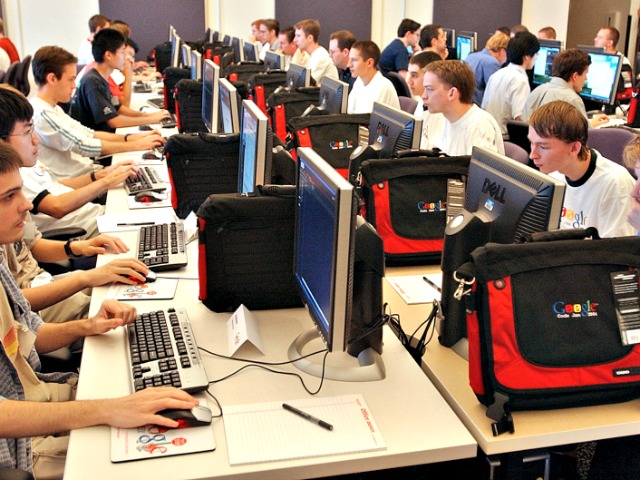Facebook, which has spent millions trying to get massive amnesty legislation that would include huge increases in the number of guest-worker permits that would lower the wages of tech workers, cannot cite any definitive evidence pointing to a shortage of American high-tech workers.
The fact that a mainstream media outlet questioned the company about those claims may say as much as Facebook’s refusal to provide evidence of the so-called shortage.
A funny thing has happened since tech industry scholars wondered why the the mainstream media were giving the high-tech industry a “free pass” on claims that there is a dire shortage of American high-tech workers.
Mainstream media outlets like CBS have started to finally examine and question those claims. And now even the pro-business Businessweek is not giving the industry a free pass.
In an article titled, “The Tech Worker Shortage Doesn’t Exist,” Businessweek cited some of the leading experts on the subject, like Rutgers University public policy professor Hal Salzman, who said that “there’s no evidence of any way, shape, or form that there’s a shortage in the conventional sense”–meaning that when the tech industry claims there is a shortage, it just wants cheaper labor.
When Businessweek asked Facebook for evidence to counter all of the evidence against its claims of a dire shortage of American high-tech workers, a spokesman reportedly responded with a one-sentence statement: “We look forward to hearing more specifics about the President’s plan and how it will impact the skills gap that threatens the competitiveness of the tech sector.”
As Businesweek noted, Salzman, as he has done in numerous reports, pointed out that when the supply of petroleum engineers “failed to keep up with the growth in oil exploration,” employers offered better pay and the shortage problem was solved, since “more people started becoming petroleum engineers, and the shortage was solved.”
The tech industry, though, does not want to offer better wages for tech workers, as Salzman noted.
Breitbart News has documented the numerous studies and experts that have all concluded that there is a surplus of American high-tech workers. Salzman has co-authored a study that found that “only half of STEM (science, technology, engineering, and mathematics) college graduates each year get hired into STEM jobs.”
Another study, released by the Center for Immigration Studies (CIS), concluded that “from 2007-2012, STEM employment averaged ‘averaged only 105,000 jobs annually,’ while the U.S. admitted about 129,000 immigrants with STEM degrees.” As the report noted, that means “the number of new immigrants with STEM degrees admitted each year is by itself higher than the total growth in STEM employment.”
In addition, as Businessweek pointed out, a 2011 Government Accountability Office review found that oversight for the H-1B program was being weakened, allowing, as Howard University public policy professor Ron Hira noted, tech companies to use the program “for cheaper, indentured labor.”
On a conference call earlier in the year that Sen. Jeff Sessions’ (R-AL) office organized, scholars wondered why wages were not going up in the tech industry if there really was a so-called shortage. Michael Teitelbaum, a senior research associate at Harvard Law School and author of a book, Falling Behind? Boom, Bust, and the Global Race for Scientific Talent, which examines these issues, stated that “nobody who is not associated with the industry that is engaged in a rather effective and expensive generalized” campaign to clamor about the “widespread shortages of scientists and engineers” has been able to provide the evidence of such shortages. Public policy professor Norm Matloff “said the high-tech industry has gotten a ‘free ride’ from the media and enjoys a very ‘positive image’ in this debate, which he said has ‘really been a non-debate.'”
Facebook co-founder Mark Zuckerberg’s pro-amnesty FWD.us group, though, “applauded” President Barack Obama’s executive amnesty, which expanded a student guest-worker program while not increasing the number of H-1B visas that are allowed. FWD.us said:
We applaud the President for taking critical steps today to fix aspects of our broken immigration system that will mean millions of families can live their lives free from fear of deportation. Moreover, we are encouraged by the President’s pledge to continue working to make it easier for entrepreneurs to create American jobs, and help keep the best and the brightest who come from around the world to study at our universities.
Todd Schulte, the president of the group, said that “our work here is not done” and pressed for a more “permanent solution to our broken immigration system our country so desperately needs,” which would include massive increases in the number of guest-worker visas the industry covets.
“We are deeply committed to continuing our fight for the legislation our country needs,” FWD.us declared.
But signs indicate that the high-tech industry may actually have to prove that there is a “critical” shortage of high-tech workers and not just rely on lawmakers and the media to parrot their specious claims about the dire need for foreign guest workers.

COMMENTS
Please let us know if you're having issues with commenting.